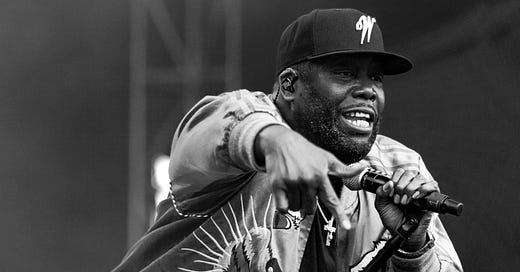Spotify | Apple | YouTube | Amazon
Hello listeners,
Today we’ve got a very special Hindsight episode that revisits the themes explored in our "Filthy Slime" episodes (Parts 1 & 2). We’re delighted to be joined by living legend and recent Grammy winner Killer Mike. He discusses his view of "rap on trial" and the complex relationship between art, crime, and life for young people in some of America’s toughest neighborhoods.
We also explore the legend of Stack Lee – AKA Stagger Lee – and the hundreds of songs and performances inspired by his most infamous crime. Writer, poet, and Washburn University professor Eric McHenry explains why this story continues to resonate more than a century after the notorious saloon murder.
As a new show, we’re still experimenting with different formats to tell stories and explore ideas. We’d love to hear your feedback! Please reach out to hello@reflector.show with your thoughts, questions, and story suggestions.
Special thanks for this episode go to Killer Mike, Kmele Foster, Van Lathan, Megan Phelps-Roper, Claire Reynolds and Eric McHenry.
Playlist of some of the music featured in this episode
Listen to Killer Mike’s recent album:
Read more from Eric McHenry here or check out his essay on Stagger Lee, which he’s currently developing into a book called Original Gangster.






A great question. For every badman/outlaw ballad in the Black tradition, there are three white ones -- Jesse James, Cole Younger, Quantrill, Sam Bass, Dick Turpin, etc. Everybody loves to sing and tell stories about dangerous men. One telling difference, I think, is that the white ballad singers tended either to explicitly condemn the outlaw's bad acts or to excuse them -- turning the outlaw into a righteous Robin Hood-type figure. Whereas the Black badman ballads made no apologies. That's an oversimplification, but there are some important differences between the traditions that I'm trying to flesh out in the book.
I first came across Staggalee in Alan Lomax's book on American folk music in my high school library in the 1960s. It was so good to hear a deep dive into its origins. As to needing a bad man and St Lpuis racism, I wonder how the legend of Jesse James fits into the bad/celebrated man narrative.